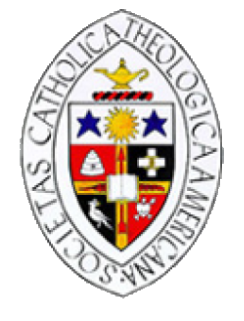Previous Convention Structure |
|
The annual convention is organized around a theme identified a year in advance. The theme is selected by the President-elect in consultation with the Board of Directors, and it aims to facilitate sustained consideration–from many theological perspectives–of a topic or set of issues of current and ongoing interest to the members of the CTSA and to the Church.
The convention typically includes four plenary sessions, three of which offer presentations by invited speakers, ordinarily members of the CTSA, but sometimes others who have special expertise regarding the theme of the convention. Invitations are made to speakers (and respondents) by the President-elect, after consultation with the Board of Directors and with other members of the Society. The fourth plenary session features the Presidential Address, given by the current President of the Society. It may or may not be related to the convention theme.
Major work of the convention takes place in the group sessions that occur at four different times during the meeting. There are 40-44 of these (depending on interest and space). Members are welcome to attend any of these sessions.
The majority of the group sessions are Continuing groups. These represent theological specialties of many kinds. They are assured space in the program on an ongoing basis in order to facilitate continuity in the consideration of certain questions, methods, figures, theological periods, sources, etc. Their status is reviewed by the Program Committee (the President-Elect and the four non-officer members f the Board) and the Board (usually every three years).
There are also group sessions that are designated as Developing groups. These are groups in which a special interest, field, topic, etc. has been identified by a number of members who foresee the possibility of establishing a new Continuing group. Developing groups are assured program space for three years, but with annual review of their ongoing significance and interest by the Program Committee. At the end of three years, if participants in a Developing group want to continue, they can apply to the Program Committee for Continuing group status.
A few group sessions are designated as Research groups. These are organized around a special topic or set of issues and they may hold space on the program, if they deem this to be useful, for three years. These groups are to be engaged in a joint research and writing project. They may be extended for two years beyond the original three-year period, but no longer. Research groups are to present a brief report of their progress annually to the Program Committee and Board.
There are approximately ten places open in the program every year for Select groups. A Call for Session Proposals is sent to members sixteen months ahead of time in the February mailing and is available on the website. Any member of the CTSA may propose a session (with topic, presenters, etc.) for one of these places in the program. Proposals are submitted to the Program Committee for consideration and selection. Proposals are selected on the basis of academic merit, contribution to Catholic theology (and its goals in the life of the church and society), and the overall balance and interests of the program. Consonance with the convention theme is encouraged, but not required. Notification of results of the Committee’s action is sent to the authors of the proposals in the late fall.
Finally there are a few Invited groups that are, in a given year, organized by the President-elect in order to meet special theological concerns and to provide balance to the program.
It is CTSA policy that session participants should be CTSA members and that presenters, panelists, and respondents are not to be listed a second time on the CTSA program. Ordinarily this guideline applies to moderators as well, but not to conveners. Exceptions are made only with clear justification. This is to provide opportunity for as many members as possible to participate in the program.


